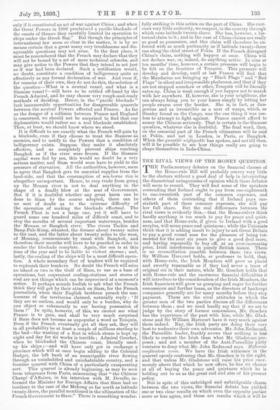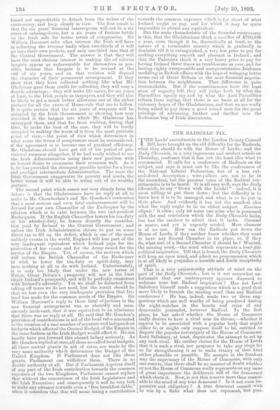THE RIVAL VIEWS OF THE MONEY QUESTION.
THE Parliamentary debates on the financial clauses of the Home-rule Bill will probably convey very little to the electors without a good deal of help in interpreting the diametrical antagonisms of opinion which these debates will seem to record. They will find some of the speakers contending that Ireland ought to pay from one-eighteenth to one-twentieth part of the common expenses, and others of them contending that if Ireland pays one- sixtieth part of these common expenses, she will pay her full share. But the real differences between the rival views is evidently this,—that the Home-rulers think hardly anything is too much to pay for peace and quiet- ness, and that Home-rule, if given to Ireland with a good surplus, will mean peace and quietness ; while the Unionists think that it is adding insult to injury to ask Great Britain to pay a good round sum for the pleasure of being tor- mented for the next six years to give a good deal more, and having repeatedly to buy off, at an ever-increasing price, Irish interference in purely British issues. There is no reconciliation possible between these two views. Sir William Harcourt holds, or professes to hold, that, with Home-rule, the Irish Members will grow as placid and sweetly reasonable as if they had never a trace of original sin in their nature, while Mr. Goschen holds that with Home-rule and the enormous financial difficulties it will introduce to the consideration of the Irish Members, the Irish financiers will grow as grasping and eager for further concessions and further loans, as the directors of bankrupt companies generally are for many months before they stop payment. These are the rival attitudes in which the greater men of the two parties discuss all the differences between them ; and we need hardly say that if we are to judge by the story of former concessions, Mr. Goschen has the experience of the past with him, while Mr. Glad- stone and Sir William Harcourt have it very much against them indeed. Nay, the Irish party are doing their very best to undeceive their own advocates. Mr. John Redmond, the Parnellite leader, frankly avows that nothing is less likely to content the Irish than what Mr. Gladstone pro- poses ; and not a member of the Anti-Parnellite party ventures to deny what Mr. John Redmond says. Habemus eanfitentem rear. We have the Irish witnesses in the quarrel openly confessing that Mr. Goschen is in the right, and that unless Mr. Gladstone will raise his price enor- mously above that which he now offers, he has no chance at all of buying the peace and quietness which he is holding out to us as the great end and aim of his present policy. But in spite of this unbridged and unbridgeable chasm between the two views, the financial debate has yielded one or two clear results on which even the opposite parties more or less agree, and these are results which it will be found not unprofitable to detach from the welter of the controversy, and keep clearly in view. The first result is that the six years financial interregnum will not be a six years of calming-down, but a six years of furious battle on the Irish side for better terms of compromise. Sir William Harcourt asks what interest the Irish will have in collecting the revenue badly when two-thirds of it will go into their own pockets, and only one-third into that of the Central Government. The answer is that they will have the most obvious interest in making the ad interim bargain appear as unfavourable for themselves as pos- sible, because that bargain is to be revised at the end of six years, and on that revision will depend the character of their permanent arrangement. If they show that they have collected nothing like what Mr. Gladstone gave them credit for collecting, they will reap a double advantage,—they will make life easier, for six years at least, to the Irish people as taxpayers, and they will also be likely to get a much better allowance out of the richer partner for all the years of Home-rule that are to follow. It it; quite certain that the six years of suspense will be occupied by the Irish Government in showing how very wretched is the bargain into which Mr. Gladstone has entra,pped them, and that far from wishing, during that time, to make the best of the case, they will be busily occupied in making the worst of it from the most patriotic pint of view,—the point of view which determines in -what sense the terms of compromise must be reconsidered, if the agreement is to become one of practical efficiency. Mr. Gladstone should have got rid of his period of pro- visional suspense altogether, if he had really wished to see the Irish Administration using their new position with an honest desire to economise their revenues well. As it is, be has provided the strongest possible motive for a loose and prodigal intermediate Administration. The more the Irish Government exaggerates its poverty and needs, the better terms it will be able to wring out of its wealthy partner. The second point which comes out very clearly from the debate is that the Gladstonians have no reply at all to make to Mr. Chamberlain's and Mr. Goschen's contention that a most serious and even fatal embarrassment will be devised for our own Chancellor of the Exchequer by the relation which is to exist between the two independent Exchequers. If the English Chancellor lowers his tea-duty or his whiskey-duty, he lowers directly the contribu- tion paid by Ireland to the Central Government ; and unless the Irish Administration choose to put on some direct tax to fill up the deficit, which is one of the most unlikely events in the world, England will lose part of the very inadequate equivalent which Ireland pays for the protection of her coasts and for the Army raised for the service of the Empire. Yet, of course, the motives which will induce the British Chancellor of the Exchequer td wish to lower the tea-duty or spirit-duty, may have nothing at all to do with Ireland. Unfortunately, it is only too likely that under the new terms of Union, Great Britain's l.rosperity will not in the least idiply Ireland's prosperity, and will be perfectly consistent with Ireland's adversity. Yet we shall be debarred from taking-off taxes we do not need, lest the result should be that we lose even the very inadequate provision. that Ire- land has made for the common needs of the Empire. Sir William Harcourt's reply to these fatal objections to the new financial arrangement was so absurdly and mon- strously irrelevant, that it was equivalent to an admission that there was no reply at all. He said that Mr. Gosohen's provision of contributions in aid of the local rates amounted to the creation of a vast number of separate and independent budgets which affected the Central Budget of the Empire in the same fashion as the Irish Budget would affect it. He can hardly have put forward this absurd fallacy seriously. As Mr. Goschen replied at once, all these so-called local budgets, all these central grants in aid of rates, are made by the very same authority which determines the Budget of the United Kingdom. If Parliament does not like these grants, Parliament can withdraw them. There is no double authority at all. But if Parliament deprives itself of any part of the Irish contribution towards the common expenses of the two Kingdoms, Parliament cannot replace that without the concurrence of the Irish Legislature and the Irish Executive; and consequently it will be very loth to make any advance towards even a "free breakfast-table," when it considers that this will mean losing a contribution towards the common expenses which is far short of what Ireland ought to pay, and for which it may be quite impossible to obtain any equivalent. But the main characteristic of the financial controversy is this, that the Gladstonians think a sacrifice of £700,000 a year, even though it be, theoretically at least, in the nature of a terminable annuity which is gradually to diminish till it is extinguished, a very low price to pay for making everything smooth and pleasant in Ireland; and that the Unionists think it a very heavy price to pay for having Ireland three times as troublesome as ever, and for having eighty irresponsible and unrepresentative Irishmen meddling in British affairs with the hope of wringing better terms out of Great Britain at the next financial negotia- tion between the neighbours. That difference is quite irreconcilable.. But if the constituencies have the least atom of sagacity left, they will judge both by what the Parnellites openly say and by what the Anti•Parnellites refrain from saying, that there is no basis at all for the visionary hopes of the Gladstonians, and that we are really being asked to pay down a good round sum for the great privilege of advancing further and further into the Serbonian bog of Irish discontents.



































 Previous page
Previous page